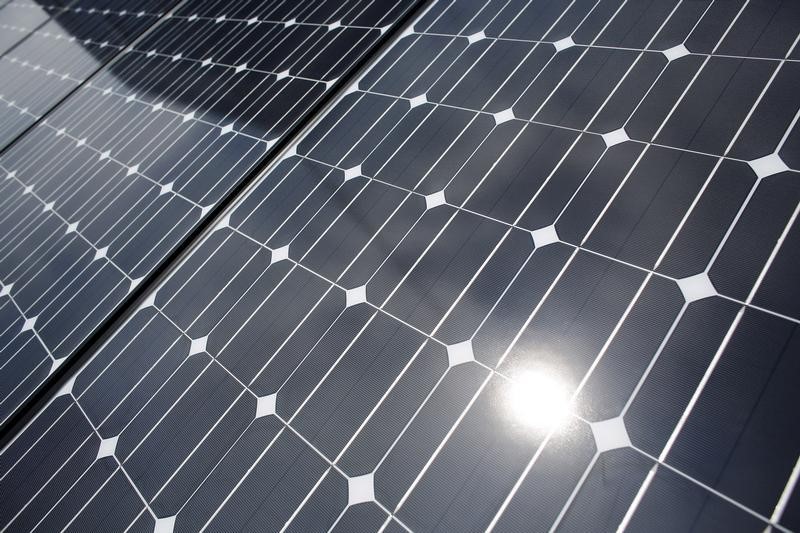* China challenges Germany as world's top solar producer
* Rise has come from large-scale parks, not on roofs
* Subsidies, falling costs make rooftop solar more
attractive
By Adam Rose
BEIJING, Dec 8 (Reuters) - China may be on the verge of
finally cracking the crucial urban and suburban solar market
thanks to a new funding model that allows buyers to have panels
installed for free.
The world's largest producer of photovoltaic panels has
built massive solar farms in the country's deserts, but a
disappointing take-up of solar power in cities and industrial
hubs has meant the country has fallen well short of official
targets.
Even as China is set to overtake Germany as the country with
the world's highest installed solar capacity, growth in
small-scale solar such as rooftop panels has been so weak that
planners didn't even bother setting new targets this year for
installations under 20 megawatts (MW) in size.
But the arrival of third-party financing models, already
popular in the United States, could help China unlock the
potential of solar like Germany and Japan, where rooftop panels
helped to boost capacity and bring record levels of renewable
energy into the power mix.
"The options today in China are a lot better than they were
12 months ago," said Ross Allan, director of business
administration at Dulwich College, Suzhou, an international
school which is considering installing panels.
TAKE-UP
China wants to boost solar capacity from 28 gigawatts (GW)
in 2014 - roughly 2 percent of the country's total power
capacity - to 100 GW by 2020.
But interest from households and businesses has been muted
due to high installation costs, difficulties acquiring rooftop
rights, limits on leases in a country where all land belongs to
the state, and relatively low returns for selling excess power
into the grid.
Small-scale installations accounted for just 17 percent of
China's installed solar capacity at end-2014, compared with at
least 70 percent of capacity in Germany, according to the
country's Federal Network Agency.
Thanks to subsidies and falling manufacturing costs,
however, a burgeoning industry to fund and install photovoltaic
(PV) panels in small-scale projects has begun to emerge that
offers the chance to go green with little upfront cost.
Small-scale solar could rise to a third of total capacity in
just five years with the help of such funding models, said Frank
Xie, senior analyst with IHS in Shanghai.
"Third-party financing is really critical to the
sustainability and the viability of the China PV market," Xie
said.
Singapore-based real estate investment firm Redwood Group,
which has carpeted its Japanese warehouses with rooftop panels,
has recently launched a 248-kilowatt (KW) pilot project in
China, where it owns more than half a million square metres of
roof space.
Redwood signed a power purchase agreement with New
York-based solar developer UGE International UG.V and its
financing partner, Hong-Kong's Blue Sky Energy Efficiency Co.
Under the Redwood deal, UGEI and Blue Sky lease rooftop
space from Redwood to operate solar panels and then sell the
electricity back to Redwood, the building owner, at prices below
grid rates.
TIME IS RIGHT
While Redwood's energy cost savings are small - initially in
the hundreds of dollars a year - the 20-year deal also allows it
to hedge against rising utility prices.
"The time is right now for solar on rooftop in China because
the cost of putting a system on the roof is becoming much more
attractive," said Tianyu Sieh, chief executive of Blue Sky.
UGEI and Blue Sky have also partnered with global real
estate services firm Jones Lang LaSalle in China to offer the
same model to its portfolio of commercial clients.
"The benefits are going to be around avoided capital,
reduced costs, or cost predictability, and branding benefits,"
Matthew Clifford, the head of Energy and Sustainability Services
for North Asia at Jones Lang LaSalle, said.
"China is the latest country where we've got a really good
business case."
While the third party-funding model encourages businesses to
install enough power to meet their own needs, a low feed-in
tariff still discourages adding extra panels to sell power back
to the grid.
To make rooftop panels ubiquitous, a higher feed-in tariff
might be needed to copy the model in Japan and Germany.
"We can put solar panels on the roof sufficient to service
our own needs," Redwood's China Construction Director Colin
Clark said. "But really we could do so much more."
($1 = 6.3981 Chinese yuan renminbi)
($1 = 122.9400 yen)
<^^^^^^^^^^^^^^^^^^^^^^^^^^^^^^^^^^^^^^^^^^^^^^^^^^^^^^^^^^^
GRAPHIC-Top 10 countries using solar power: http://reut.rs/1Qa5QuJ
^^^^^^^^^^^^^^^^^^^^^^^^^^^^^^^^^^^^^^^^^^^^^^^^^^^^^^^^^^^>
(Editing by Henning Gloystein and Richard Pullin)
